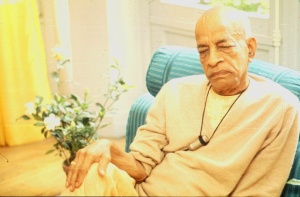SB 3.27.19

A.C. Bhaktivedanta Swami Prabhupada
TEXT 19
- akartuḥ karma-bandho 'yaṁ
- puruṣasya yad-āśrayaḥ
- guṇeṣu satsu prakṛteḥ
- kaivalyaṁ teṣv ataḥ katham
SYNONYMS
akartuḥ — of the passive performer, the nondoer; karma-bandhaḥ — bondage to fruitive activities; ayam — this; puruṣasya — of the soul; yat-āśrayaḥ — caused by attachment to the modes; guṇeṣu — while the modes; satsu — are existing; prakṛteḥ — of material nature; kaivalyam — freedom; teṣu — those; ataḥ — hence; katham — how.
TRANSLATION
Hence even though he is the passive performer of all activities, how can there be freedom for the soul as long as material nature acts on him and binds him?
PURPORT
Although the living entity desires freedom from the contamination of matter, he is not given release. Actually, as soon as a living entity puts himself under the control of the modes of material nature, his acts are influenced by the qualities of material nature, and he becomes passive. It is confirmed in Bhagavad-gītā, prakṛteḥ kriyamāṇāni guṇaiḥ: (BG 3.27) the living entity acts according to the qualities or modes of material nature. He falsely thinks that he is acting, but unfortunately he is passive. In other words, he has no opportunity to get out of the control of material nature because it has already conditioned him. In Bhagavad-gītā it is also stated that it is very difficult to get out of the clutches of material nature. One may try in different ways to think that everything is void in the ultimate issue, that there is no God and that even if the background of everything is spirit, it is impersonal. This speculation may go on, but actually it is very difficult to get out of the clutches of material nature. Devahūti poses the question that although one may speculate in many ways, where is liberation as long as one is under the spell of material nature? The answer is also found in Bhagavad-gītā (BG 7.14): only one who has surrendered himself unto the lotus feet of the Supreme Lord Kṛṣṇa (mām eva ye prapadyante) can be freed from the clutches of māyā.
Since Devahūti is gradually coming to the point of surrender, her questions are very intelligent. How can one be liberated? How can one be in a pure state of spiritual existence as long as he is strongly held by the modes of material nature? This is also an indication to the false meditator. There are many so-called meditators who think, "I am the Supreme Spirit Soul. I am conducting the activities of material nature. Under my direction the sun is moving and the moon is rising." They think that by such contemplation or meditation they can become free, but it is seen that just three minutes after finishing such nonsensical meditation, they are immediately captured by the modes of material nature. Immediately after his high-sounding meditation, a "meditator" becomes thirsty and wants to smoke or drink. He is under the strong grip of material nature, yet he thinks that he is already free from the clutches of māyā. This question of Devahūti's is for such a person who falsely claims that he is everything, that ultimately everything is void, and that there are no sinful or pious activities. These are all atheistic inventions. Actually, unless a living entity surrenders unto the Supreme Personality of Godhead as instructed in Bhagavad-gītā, there is no liberation or freedom from the clutches of māyā.